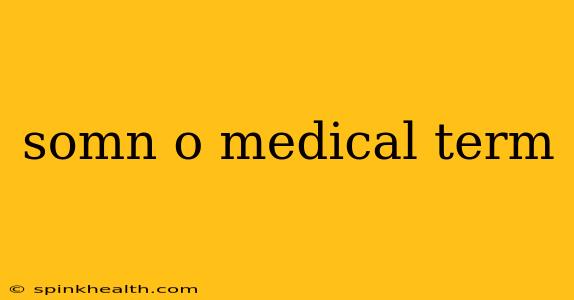Somn: Unraveling the Medical Mystery of Sleep
The word "somn" might seem like a cryptic whisper from a medical textbook, but it holds a key to understanding the fascinating world of sleep. Derived from the Latin word for sleep, somnus, "somn" is a root frequently used in medical terminology to describe anything related to slumber. It's not a standalone medical term itself, but rather a building block for a multitude of words that paint a detailed picture of sleep's complexities.
What does somn actually mean in medical terms?
In short, "somn" means sleep. It acts as a prefix or root indicating a connection to sleep, sleep disorders, or sleep-related processes. Understanding this foundation is crucial for deciphering numerous medical terms related to sleep medicine.
What are some medical terms that use "somn"?
Let's delve into some common examples to illustrate the versatility of "somn" in medical terminology:
-
Somnolence: This refers to a state of drowsiness or sleepiness, often characterized by excessive daytime sleepiness. It's a symptom, not a diagnosis, and can be caused by various underlying conditions.
-
Somnambulism: This is the more formal term for sleepwalking, a parasomnia where an individual performs actions while asleep, often without conscious awareness.
-
Somniloquy: Ever heard someone talking in their sleep? That's somniloquy, meaning sleep talking. Like sleepwalking, it's a common parasomnia.
-
Hypersomnia: This refers to excessive sleepiness, often characterized by prolonged sleep episodes and difficulty staying awake during the day. It's a symptom that can be indicative of various medical conditions.
-
Insomnia: While not directly using "somn," insomnia, the inability to fall asleep or stay asleep, represents the opposite end of the sleep spectrum.
-
Somniferous: This adjective describes a substance or agent that induces sleep. This term highlights the broader application of "somn" beyond specific sleep disorders.
How is somn used in the diagnosis and treatment of sleep disorders?
The root "somn" is vital in the clinical vocabulary used to describe, diagnose, and treat sleep disorders. For instance, a doctor might note "somnolence" in a patient's chart, indicating a symptom that requires further investigation. The understanding of "somn" allows medical professionals to communicate precisely about sleep-related issues and accurately reflect the patient's condition.
What are some common causes of sleep disorders involving "somn"?
Various factors contribute to sleep disorders involving the "somn" root. These can range from underlying medical conditions like sleep apnea, neurological disorders, or hormonal imbalances to lifestyle factors such as stress, poor sleep hygiene, and irregular sleep schedules. The root allows the accurate classification and description of these related disorders.
Are there any other related words that use "somn"?
While the terms listed above are common, the root "somn" is surprisingly versatile. You might encounter less frequently used terms, but all ultimately point back to the core meaning of sleep. This highlights the enduring relevance of the Latin root in modern medical terminology.
In conclusion, while "somn" isn't a term you'd find in a diagnosis itself, understanding its role as a building block in sleep-related medical terminology is crucial. It acts as a linguistic key, unlocking a clearer understanding of various sleep conditions and allowing for precise communication within the medical field. So, next time you encounter a medical term starting with "somn," remember its Latin origins and its powerful connection to the fascinating world of sleep.

